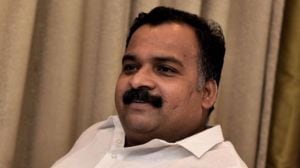Left opposes privatisation in power sector
Here comes another roadblock for the UPA8217;s reform agenda. The Left parties have come out strongly against privatisation in the power se...

Here comes another roadblock for the UPA8217;s reform agenda. The Left parties have come out strongly against privatisation in the power sector in a carefully prepared note on the 8216;8216;Review of Electricity Act, 20038217;8217;.
The note was submitted to the UPA leadership at yesterday8217;s coordination committee. It highlights the Left8217;s reservations on the Act, as well as the draft National Electricity Policy, which was circulated by P.M. Sayeed8217;s Power Ministry. The Union Minister has claimed that a number of private players have shown interest soon after browsing through the draft policy.
The Left parties feel the policy need to be worked out keeping the interest of consumers in mind and in consultation with state governments. They have reminded the UPA that the CMP states: 8216;8216;The review of the Electricity Act, 2003, will be undertaken in view of the concern expressed by a number of states.8217;8217; It has accused the Centre of drawing up the National Electricity Policy without the 8216;8216;mandatory8217;8217; consultation with state governments. And it has cited the names of Orissa, Delhi and Andhra Pradesh, where some degree of power reforms have been carried out.
In a nine-point note, running into four pages, the Left has argued that there should not be any bifurcation of responsibilities in the power sector 8212; that 8216;8216;generation, transmission and distribution are closely interconnect activities that need to be coordinated in a holistic manner8217;8217;. And 8216;8216;public ownership is desirable8217;8217; and supply of electricity 8216;8216;cannot be ..dictated by market forces.
The note does not refer to West Bengal where a private company, the CESC, has been supplying power to Kolkata since the British days. The company has not been nationalised, even though there were such fears when the Left Front first assumed power in 1977.
The second point raised by the Left is there should not be any 8216;8216;statutory distinction between rural and urban8217;8217;. It says this would have serious implications on agriculture, powerlooms, streetlights, waterworks and almost 75 per cent of the rural population.
Thirdly, the Left is against power given to the State Electricity Regulatory Commission SERC, which has the right to take decisions under Sections 79 and 86 of the Electricity Act. The note says: 8216;8216;The state governments have been burdened with a lot of responsibility but with almost no authority.8217;8217;
The Left insists 8216;8216;this cannot be a body which can overrule or ignore the declared objectives of the state governments8217;8217;.
Fourth, the Left wants the Act to properly define 8216;8216;cross-subsidisation8217;8217;. It says that Section 61 g of the Act mentions that the 8216;8216;tariff should progressively reflect the cost of supply of electricity and also reduce and eliminate cross-subsidies8217;8217;. The Left wants the two words 8216;8216;reduce8217;8217; and 8216;8216;eliminate8217;8217; to be deleted.
In its fifth argument, the Left wants not just the states but the Centre also to bear the cost of providing power to the countrywide. For this, it wants an amendment to Section 6 8216;8216;so that the obligation to electrify rural areas rests both upon the Central and state governments8217;8217;.
Sixth, the Left feels that 8216;8216;distribution licences should be granted by the state governments only. Otherwise, all lucrative areas for distribution are likely to be picked up by private distribution licences to the detriment of the SEBs and distribution companies8217;8217;.
The seventh point is actually a demand. The Left insists that the profits of a regulated sector like power 8216;8216;should be capped, based on prime RBI lending rate and not an arbitrary figure like 14-16 per cent8217;8217; 8212; the guaranteed return pledge to IPPs Independent Power Producers. It wants 8216;8216;power to be made available at an affordable rate to all sections of the people8217;8217;.
As the eighth point, the Left has rued the 8216;8216;emasculation of the Central Electricity Authority8217;8217;. The CEA was an institution that thrived as long as the government was rooted in its conviction that power sector would never be privatised. In its ninth argument, the Left has addressed a number of technical issues like 8216;8216;open access8217;8217;.
- 01
- 02
- 03
- 04
- 05































